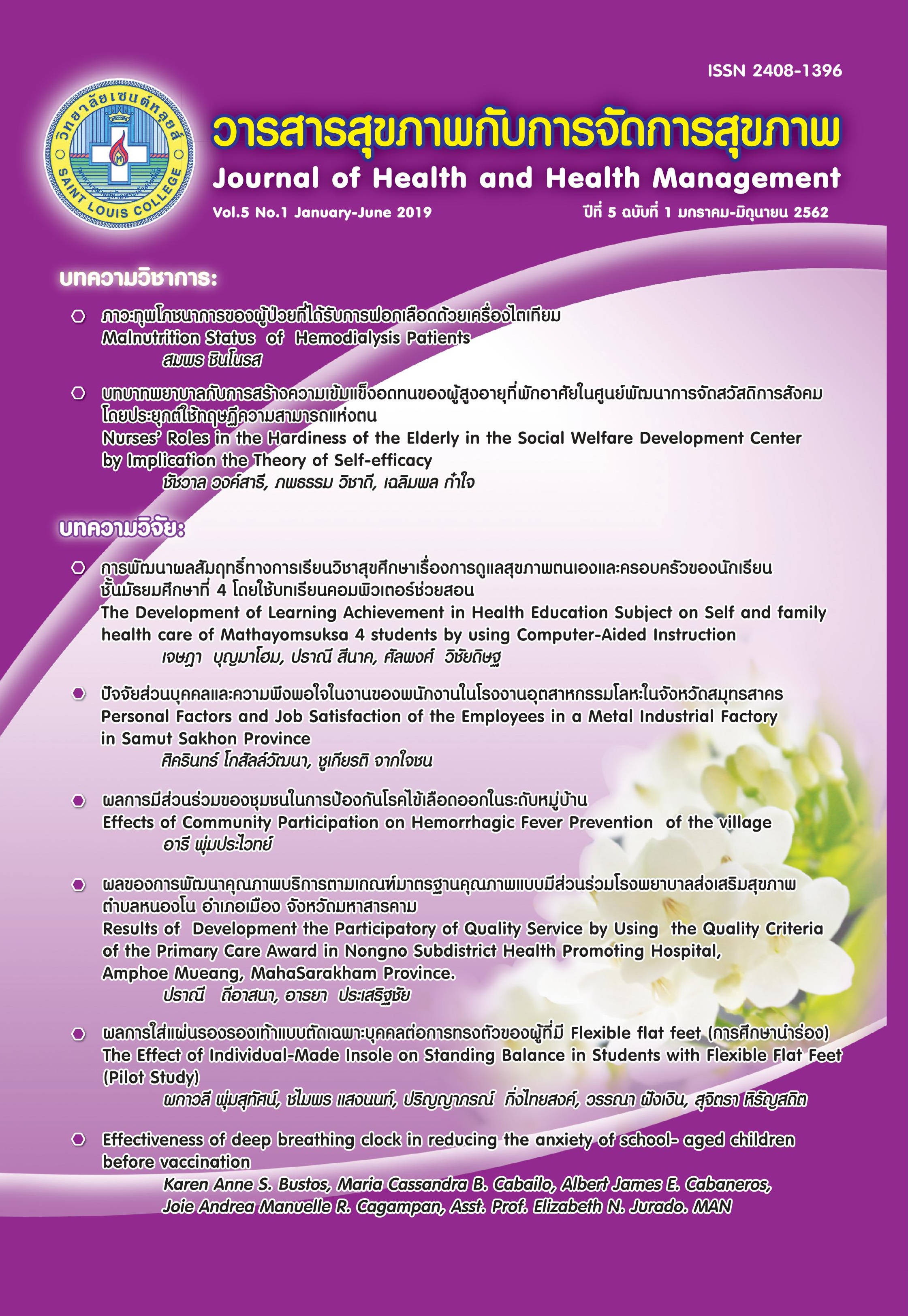Nurses’ Roles in the Hardiness of the Elderly in the Social Welfare Development Center by Implication the Theory of Self-efficacy
Keywords:
Hardiness of the Elderly, Older adult in the social welfare development center, Implication the theory of Self-EfficacyAbstract
This article aims to present the concept of nursing as an important factor in strengthening an older adult as well as the physical and mental health of the older adult person. Currently Thailand had older adult 1,317 person live in the center of social welfare development 12 nationwide. The most common causes are poverty, homelessness. The elderly who have conflicts with family members cause suffering both physically and mentally as a result of being unable to live with the family. Once in service adapt to the new environment, such as adaptation to new friends, new places, new caregivers, new livelihoods. Divorce with traditional environment distant family some older adult person understands that they are being their abandoned in body stress, decreased self - esteem, loneliness, depression and recurrent disease. These symptoms cause negative effects on the elderly, the symptoms are called “Not hardiness of the Elderly”. To provide holistic nursing care. This article therefore aims to present the nursing role in hardiness for the elderly, which is like the body immunity and psychosocial in the elderly, include 3 roles as follow: (1) Assessing the condition and finding the factors that correlate with older adult hardiness and endurance. (2) Applying the theory of self - efficacy for creating endurance and hardiness for an older adult. (3) Nursing outcome management and outstanding professional obviously.
References
ชัชวาล วงค์สารี และศุภลักษณ์ พื้นทอง. (2561). ภาวะ สมองเสื่อมในผู้สูงอายุ: การพยาบาลและการดูแล ญาติผู้ดูแล. วารสาร มฉก. วิชาการ. 22(3), 166 - 179.
ชัชวาล วงค์สารี. (2561). สถานการณ์ของผู้สูงอายุที่มี ภาวะสมองเสื่อมในประเทศไทย: ประเด็นและแนว โน้มการดูแลทางการพยาบาล. วารสารฉบับ วิทยาศาสตร์และเทคโนโลยี มหาวิทยาลัยอีสเทิร์น เอเชีย. 1(1), 47 - 58.
ชัชวาล วงค์สารี. (2560). ผลกระทบหลังการเกิดภาวะ สมองเสื่อมกับผู้สูงอายุในประเทศไทย. วารสาร มหาวิทยาลัยคริสเตียน. 23(3), 680 - 689.
ชัชวาล วงค์สารี. (2558). การให้การพยาบาลผู้ป่วยฟอก เลือดด้วยเครื่องไตเทียมด้วยการสอนสุขภาพ. วารสารฉบับวิทยาศาสตร์และเทคโนโลยีมหาวิทยาลัย อีสเทิร์นเอเชีย. 9(1), 15 - 24.
ชัชวาล วงค์สารี. (2559). บทบาทพยาบาลกับการดูแล ผู้ป่วยโรคเรื้อรังที่มีปัญหาเพศสัมพันธ์. วารสาร มหาวิทยาลัยคริสเตียน. 22 (2), 128 - 136.
บรรลุ ศิริพานิช. (2560). รายงานสถานการณ์ผู้สูงอายุไทย ประจำปี พ.ศ. 2560. นิธิสถาบันวิจัยและพัฒนา ผู้สูงอายุไทย กรุงเทพฯ: บริษัท โรงพิมพ์เดือนตุลา จำกัด.
ผกาพันธ์ุ วุฒิลักษณ์. (2541). ความสัมพันธ์ระหว่างความ ยุ่งยากประจำวันกับความเข้มแข็งอดทนของ อาจารย์มหาวิทยาลัยเชียงใหม่. มหาวิทยาลัย เชียงใหม่.
มูลนิธิสถาบันวิจัยและพัฒนาผู้สูงอายุไทย. (2557). รายงานการสังเคราะห์ระบบการดูแลผู้สูงอายุ ในระยะยาวสำหรับประเทศไทย. กรุงเทพฯ: ที คิว พี.
ภพธรรม วิชาดี, วารี กังใจ และสหัทยา รัตนจรณะ. (2560). ปัจจัยที่มีความสัมพันธ์กับความเข้มแข็ง อดทนของผู้สูงอายุที่พักอาศัยในศูนย์พัฒนาการจัด สวัสดิการสังคมผู้สูงอายุ. การประชุมวิชาการและ นำเสนอผลงานวิจัยระดับชาติ ราชธานีวิชาการ ครั้งที่ 2 วันที่ 26 - 27 พฤษภาคม พ.ศ. 2560: มหาวิทยาลัยราชธานี อุบลราชธานี.
ศิริพันธุ์ สาสัตย์. (2554). การพยาบาลผู้สูงอายุ: ปัญหา ที่พบบ่อยและแนวทางในการดูแล. (พมิ พ์ครั้งที่ 3). กรุงเทพฯ: สำนักพิมพ์แห่งจุฬาลงกรณ์มหาวิทยาลัย.
สมจิต หนุเจริญกุล และอรสา พันธ์ภักดี. (2553). การปฏิบัติการพยาบาลขั้นสูง: บูรณาการสู่การ ปฏิบัติ. สภาการพยาบาล นนทบุรี:จุดทอง การพิมพ์.
สิริลักษณ์ โสมานุสรณ์. (2557). ความต้องการการดูแล ในระยะสุดท้ายของผู้สูงอายุในสถานสงเคราะห์ คนชรา. วารสารพยาบาลสงขลานครินทร์. 34(1), 71 - 88.
สายพิณ ยอดกุล และจิตภินันท์ ศรีจักรโครต. (2555). ปัจจัยทำนายภาวะซึมเศร้าในผู้สูงอายุโรคเรื้อรัง ที่เข้ารับการรักษาในโรงพยาบาลบุรีรัมย์. วารสาร สมาคมพยาบาลภาคตะวันออกเฉียงเหนือ. 3(3), 50 -57.
สำนักงานสถิติแห่งชาติ. (2558). ความคิดเห็นของ ประชาชน. สืบค้นเมื่อ 20 มิถุนายน 2561 จาก http://www.nso.go.th/sites/2014.
ลัญชนา พิมพ์พันธ์ชัยบูรณ์. (2559). ปัจจัยที่มีอิทธิพลต่อ ความหว้าเหว่ของผู้สูงอายุในศูนย์พัฒนาการจัด สวัสดิการสังคมผู้สูงอายุ. (วิทยานิพนธ์ พยาบาลศาสตร มหาบัณฑิต สาขาการพยาบาลผู้สูงอายุ). ชลบุรี: มหาวิทยาลัยบูรพา.
อินทุกานต์ กุลไวย. (2552). ความสัมพันธ์ระหว่างความ เข้มแข็งอดทน การสนับสนุนทางสังคมกับความ สามารถในการดูแลตนเองของผู้สูงอายุ. (วิทยานิพนธ์ พยาบาลศาสตรมหาบัณฑิต สาขาการพยาบาล สุขภาพจิตและจิตเวช). ปทุมธานี: มหาวิทยาลัย ธรรมศาสตร์.
American Association for Geriatric Psychiatry. (2015). Beat Depression to Stay Healthier and Live Longer, A Guide for Older Adults and Their Families. Retrieved June 20, 2018, from: http://www.aagpgpa.org.
Bandura, (1978). The self-system in reciprocal determinism. American Psychologist. 33(4), 344 - 358.
Beigi, M., & Shirmohammadi, M. (2011). Effects of an emotional intelligence training program on service quality of bank branches. Managing Service Quality: An International Journal. 21(5), 552 - 567.
Herth, K. (1990). Fostering hope in terminally - ill people. Journal of advanced nursing. 15(11), 1250 - 1259.
House, J. S. (1981). Work stress and social support. London: Addition Wesley.
Kobasa, S. C. (1979). Stressful life events, personality, and health: an inquiry into hardiness. Journal of Personality Social Psychology. 37(1), 1 - 11.
Kobasa, S. C. (1982). The hardy personality: Toward a social psychology of stress and health. Journal of Personality Social Psychology. 59(4), 747 - 769.
Kobasa, S. C., Maddi, S. R., & Courington, S.(1981). Personality and constitution as mediator in The stress - illness relationship. Journal of Health and Social Behavior. 22(6), 368 - 378
Kobasa, S. C., Maddi, S. R., & Kahn, S. (1982). Hardiness and health: a prospective study. Journal of personality and social psychology. 42(1), 168.
Kobasa, S. C. O., Maddi, S. R., Puccetti, M. C., & Zola, M. A. (1985). Effectiveness of hardiness, exercise and social support as resources against illness. Journal of psychosomatic research. 29(5), 525 - 533.
Miller, C. A. (2004). Nursing for wellness in older adults: Theory and practice. (6th ed). Lippincott Williams & Wilkins.
Pollock, S. E. (1986). Human responses to chronic illness: Physiologic and psychosocial adaptation. Nursing and Health. 12(3), 179- 186.
Zamani, S. N., Bahrainian, S. A., & Ashrafi, S. (2015). Impresment Spiritual Intelligence on the Quality of life and Psychological well being among the elderly living nursing home in bandar abbas. Iranian Journal of Geriatric Nursing. 1(4), 82 - 94.




